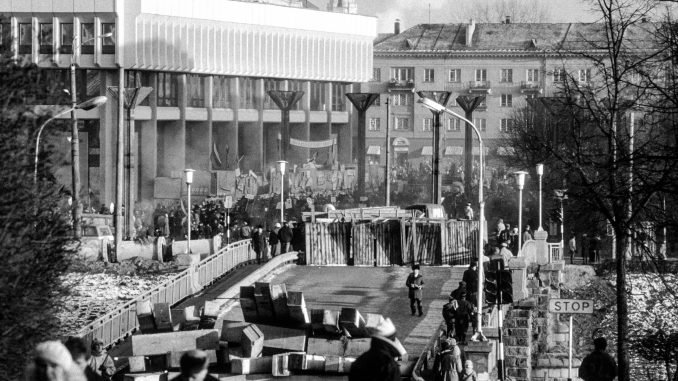
The New York Times reporter Bill Keller described the incidents on the streets of Vilnius, he wrote: “A group of young Lithuanian men stood in front of the tank and tried to stop it, but it did not stop moving. Three or four bloody people were left lying on the ground.”
Keller described the tension at the centre of the independence movement’s headquarters with Chairman of the Supreme Council, Lithuanian President Vytautas Landsbergis (almost all Western media called him the president) nervously walking around the parliament and discussing the options for the new Lithuanian government in the case of a Soviet takeover – including establishing a government in exile.
“Is it true that Mr. Bush sold us out? We heard on the radio that he ignores the events in Lithuania as he is more concerned about the Persian Gulf,” Landsbergis asked in English according to Keller.
Keller said that later Landsbergis shared concerns that the Kremlin deliberately chose a time for conflict when the White House was occupied with the war in Iraq and the Persian Gulf and would likely to be less critical of Mikhail Gorbachev.
The Washington Post maintained a more moderate tone and declared that the Kremlin had decided to appease the symbolic resistance in Lithuania with military power.
“Many Lithuanian politicians have expressed concern that Gorbachev could take advantage of unrest in order to introduce presidential rule in the country and suspend democratic institutions,” wrote the Washington Post.
“Lithuanian President Vytautas Landsbergis compared these events to the violence on June in 1940, when Lithuania was forced to join the Soviet Union,” the newspaper recounted.
The British national broadcaster BBC informed viewers that “at least 13 people were killed and 140 wounded by the Soviet military aggression in the Lithuanian capital as Moscow continues trying to stop the Baltic country‘s onslaught to freedom”.
“Military forces broke through the barricades of almost a thousand unarmed people at the Lithuanian Radio and Television Centre at about 2 pm local time,” the BBC reported.
The BBC journalists stressed that none of the Lithuanians retreated, and the struggle lasted for almost an hour and a half. The BBC added that this is the bloodiest attack since 1989, when the Soviet army killed nine protesters in Georgia.
The BBC noted that Boris Yeltsin condemned the attacks and demanded that Soviet forces be removed from the Baltic States.
Swedish media had started discussing the possibility of accept thousands of refugees from the Baltic countries if the Soviet Army starting using force across all the Baltic states to subdue resistance.
15min.lt

Be the first to comment